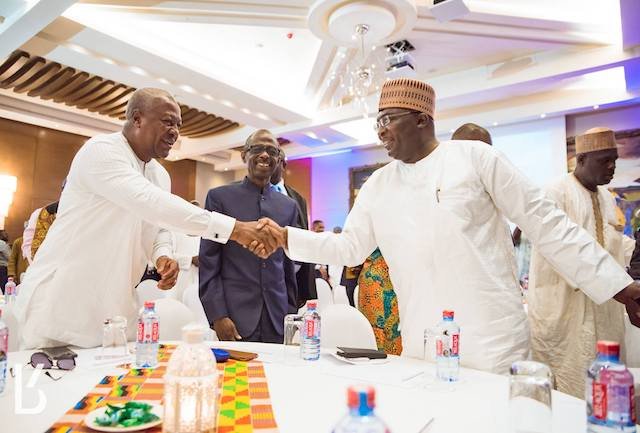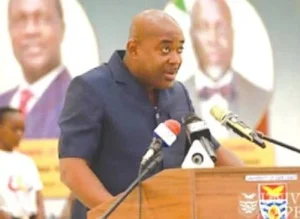
John Mahama & Dr Mahamudu Bawumia
As Ghana approaches another electoral season, the manifestos of the New Patriotic Party (NPP) and the National Democratic Congress (NDC) have reignited the debate over the size of government. Both parties claim that Ghana can be effectively governed with a cabinet not exceeding 60 ministers, but is this commitment to a ‘lean government’ genuine, or merely lip service?
The NPP has promised to operate with 50 ministers, while the NDC pledges to manage with 60. At first glance, these numbers may seem like a significant reduction, especially compared to previous administrations. However, the lack of a detailed plan on how this reduction will be achieved raises concerns. Neither party has provided a roadmap outlining which specific ministries will be scrapped, merged, or reorganized, leaving many to wonder if these promises are simply superficial gestures.
For those familiar with Ghana’s political landscape, it’s no secret that some CEOs of state-owned enterprises earn more than ministers. This disparity begs the question: Is merely reducing the number of ministers enough to achieve a leaner, more efficient government? The answer seems to be a resounding no.
Take, for instance, the energy sector. Why do we need the Ghana Grid Company (GRIDCo) to receive power from the Volta River Authority (VRA) only to pass it on to the Electricity Company of Ghana (ECG)? This extra layer not only complicates the process but also adds to government bloat. Wouldn’t it be more efficient for VRA to sell directly to ECG? And what exactly are the roles of TOR, BOST, NPA, and the Petroleum Commission in this crowded energy landscape?
Similarly, why does the Produce Buying Company (PBC) exist when the Cocoa Board can handle its responsibilities? And why do we need a Ghana Tourism Development Company (GTDC) when we already have the Ghana Tourism Authority and the Ministry of Tourism? These redundant layers of bureaucracy serve only to inflate government size without adding significant value.
Even more perplexing is the separation of fisheries from agriculture, which seems like an arbitrary division that only adds to administrative complexity. Meanwhile, agencies like the National Youth Authority (NYA), Youth Employment Agency (YEA), and the National Entrepreneurship & Innovation Programme (NEIP) operate independently, and consolidating them could streamline operations and reduce costs.
We have the GBC, Graphic Corporation, Ghanaian Times, and Ghana News Agency all essentially performing the same functions.
The question extends to other areas of government as well. If the police are responsible for protecting life and property, why can’t the Fire Service be a unit under the Ghana Police Service? And what exactly is the Ministry of Employment doing? What is the Sanitation Ministry sanitizing? These are critical questions that need answers if the government is serious about efficiency.
The idea of merging the Communication and Information Ministries also makes sense, as does eliminating the Railway Ministry by folding it into the Ministry of Transport. Aviation and river transportation should be under one umbrella, not scattered across multiple departments.
In reality, some ministries would be better suited as agencies and certain state-owned enterprises operate more like ‘corner shops’ than essential government bodies. Reducing the number of ministers is a step in the right direction, but it is far from sufficient. To truly create a lean government, the remuneration and perks of these ministers must be re-evaluated. Will the 50 or 60 ministers still receive Toyota Land Cruisers every two or four years? Will they continue to enjoy medical tourism abroad? What will happen to their allowances?
Moreover, there should be an age limit for ministers, and no one should remain in office for more than two years if they prove to be incompetent. A lean government is not just about numbers—it’s about functionality and efficiency.
You cannot claim to govern with a lean government while simultaneously creating more state-owned enterprises. For a start, we need a clear idea of which 50 or 60 ministries will remain, and how these remaining ministries will be made more efficient.
Additionally, the state of critical infrastructure like Feeder Roads, the Public Works Department, and Town and Country Planning must be addressed. Have these departments been given the resources and tasks they need to function effectively? Or are they just more examples of inefficiency and mismanagement?
In the end, the NPP and NDC must go beyond empty promises. They must provide concrete plans that demonstrate a genuine commitment to downsizing the government—not just in terms of numbers, but in terms of improving functionality and eliminating waste. Anything less would be just more lip service, and Ghana deserves better.






